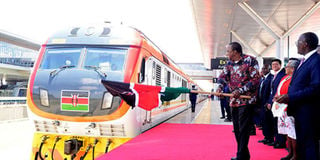How SGR fits in our confusing economic policy and ideology

President Uhuru Kenyatta launches the Nairobi-Suswa Madaraka Express train service, which is part of SGR Phase 2A, on October 16, 2019 in Ongata Rongai, Nakuru County. The project is a loss-making venture. PHOTO | FILE | NATION MEDIA GROUP
What you need to know:
- It is unlikely that IMF, which abhors subsidies, will grant the government the much-needed policy space and support to rebuild state enterprises.
- The ultimate goal of our evolving IMF-guided economic policy is a free market driven by the private sector.
President Uhuru Kenyatta’s launch of “a railway to nowhere” is a contradiction and an example of Kenya’s confused economic ideology.
The country has borrowed and invested heavily in potentially the biggest loss-making venture of all time that features grandiose train stations.
Since the fanfare, we now know getting to Syokimau, and onward beyond Suswa, is a logistical nightmare and that the railway literally ends in the bushes.
This is precisely why rail development and operation are outsourced to private investors. Just how did we get here?
It’s been three decades since developing countries came under the infamous structural adjustment programmes (SAPs) of Washington’s “unholy trinity” of the World Bank, the IMF and the US Treasury.
President Daniel arap Moi saw and warned us against hidden dangers of these policies. He eloquently spoke against the folly of carelessly embracing foreign ideologies.
CONTESTED IDEOLOGY
Moi warned us that SAPs would destroy our nascent industrial base, accentuate tribalism and undermine governance and performance of the State. This, he said, would lead to a weak, impoverished and divided people.
SAPs were a creation of American conservatives in the White House, the Congress and Wall Street to impose their economic paradigms on developing countries.
And the timing was perfect, since the Soviet Union was experiencing an unexpected implosion.
Conservatives pushed a contested ideology that demanded that the private sector be the sole, if not primary, agent in undertaking economic activities, including production and distribution of goods and services.
Then and now, they fret big governments and claim that State bureaucracy and regulations are bad for all.
Pointing to subsidies, inefficiencies and poor economic growth rates, IMF and World Bank delegations forced governments into selling parastatals and exiting the market space.
JOB CUTS
In turn, they sold a dream, that deregulation and liberalisation would attract massive foreign capital and technology, which, in turn, would boost productivity, create employment and raise the standards of living.
Moi was forced to undertake painful public sector job cuts in an exercise we called “retrenchment”.
He begrudgingly made other concessions — like letting cash-strapped Uchumi, Kenatco and Nyayo Bus fall. He resisted pressure to fully liquidate Kenya Airways, Kenya Seed Company, Agricultural Development Corporation, sugar mills and several banks.
As Moi dug in, political and financial pressure was ratcheted up. Development partners shunned the country, yet they insisted that outstanding loans be paid in full and on time!
President Mwai Kibaki inherited a broke country that was essentially under sanctions. His regime looked East for new monies but earnestly courted the West by implementing the very things Moi found unacceptable.
He fast-tracked privatisation and let struggling public enterprises like PanPaper decay and fall.
DELETERIOUS EFFECTS
We cannot pretend that the government has the goodwill to revive State-owned enterprises like Mumias Sugar Company and KQ.
To the contrary, expect the likes of NCPB, KBC, KTDA, KPA, Kenya Power and KCC to eventually collapse.
It is unlikely that IMF, which abhors subsidies, will grant the government the much-needed policy space and support to rebuild state enterprises.
Deleterious effects of SAPs are clear: public education and healthcare systems are collapsing because the elite, who have an alternative, find little value in them.
Mainstreaming private security and investigators will further undermine the corrupt police service and other security agencies.
National ethos and values have been replaced with egocentrism and ‘shortermism’ as our public and political system, continue to be infested by corruption, greed and tribalism.
FREE MARKET
Public projects serve private interests. And then, there is a sickening lack of seriousness in public appointments.
There is a perception that decision-makers do not know what is at stake, or they simply do not care.
The ultimate goal of our evolving IMF-guided economic policy is a free market driven by the private sector.
The government’s contradictory is to overburden taxpayers with a controversial public rail yet be unwilling to revive regional economic entities like Mumias Sugar and Bamburi Cement.
Mr Chesoli is a New York-based development economist and global policy expert. [email protected]) @kenchesoli





